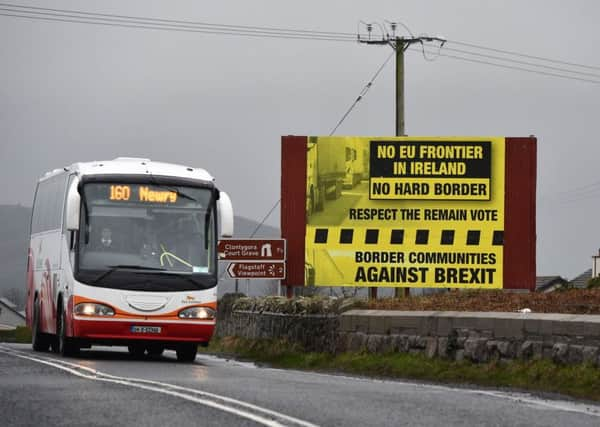Alastair Campbell: Brexit poses a threat to peace in Northern Ireland


Twenty years ago today something miraculous came together and the Good Friday Agreement was born. Securing peace in Northern Ireland was incredibly difficult, but it ranks as one of the greatest and most important achievements of the last Labour government.
Almost from the day Tony Blair took office, Northern Ireland became a priority, and it never stopped being a priority.
Advertisement
Hide AdAdvertisement
Hide AdBuilding on work that had begun under John Major, we were convinced a peace once described as impossible was there for the taking, provided we got the different sides to agree to certain principles, then leave the rest to hard work, commitment and negotiation. There were moments in the months and years after when it still felt like everything could fall apart, but a remarkable group of people on all sides of the debate, with support from around the world, was determined to prevent that.
Now, as we mark the 20th anniversary of the Agreement, at a time when the political process remains fragile and the institutions in abeyance, there is the terrifying prospect that Brexit could turn back the clock and put at risk the peace and prosperity that all that hard work helped deliver. Terrifying not least because it is clear the Brextremist ideologues feel no price is too high to get out of Europe, and that would include an Agreement which to them is more of an irritant than an essential building block of peace.
How – when we are out of the EU, and Ireland remains in – can the only land border between two separate political and economic entities be free of any border infrastructure or ‘frictionless’? There is no answer to that question. And if a solution is found to prevent a border on the island of Ireland, it effectively moves to the Irish Sea – with huge implications for Scotland.
The Good Friday Agreement wasn’t about cameras and trade, but a political settlement that recognised the rights of both unionists and nationalists, and the importance of economic and cultural links between the North and the Republic. That there are people willing to undermine that is deeply troubling. I find it incredible that Theresa May is prepared to risk going down in history as the Tory Prime Minister who not only undid Margaret Thatcher’s project of completing the Single Market, but also undermined John Major’s achievements in Northern Ireland. But while the Tories are the architects of Brexit, as things stand it is the Labour opposition which history will write as its handmaiden.
Jeremy Corbyn is not in power. But he does have power, not least given the Parliamentary arithmetic that followed Mrs May’s doomed attempt to win landslide support for hard Brexit. Yet he seems reluctant to use that power to shift the government’s course. Indeed, he seems as hellbent on Brexit at any price as she does. He prides himself on being the most left-wing leader Labour has ever had. So why has he done so little to challenge the drift to this hard-right, hard Brexit that the Johnsons, Goves, Duncan-Smiths, Redwoods, Rees-Moggs and Farages have forced on Mrs May? Having dared to speak up for the millions of voters who remain anxious and fearful about Brexit, and those who want to put the final Brexit deal to a people’s vote, not least because they do not trust this government and this Parliament to do the right thing, Owen Smith was sacked by Jeremy Corbyn.
The party’s Brexit spokespeople in Westminster and Holyrood, Keir Starmer and Neil Findlay, refuse even to contemplate the possibility that the deal may be so bad for Britain that it will be worth revisiting the basic In or Out decision. Whatever the deal. Whatever the cost. It leaves one wondering whatever is the point of an opposition if we are just echoing the government on the biggest question facing the country for a generation?
We really are in the most extraordinary position where most MPs, left to their own devices, would vote against what the government is proposing, by a considerable margin, but the frontbenchers of two main parties are locked in a deadly embrace to deliver something they both acknowledge will damage our lives and living standards. It is madness. There are millions of people in Scotland and across the UK who share that view, that this is madness. Why are there so few in Parliament speaking up for them? And why are the leaders of the main parties so scared of the details of the deal – when we will know what Brexit meaning Brexit really does mean – being put to a People’s Vote?
Alastair Campbell was Downing Street press secretary when the Good Friday Agreement was reached